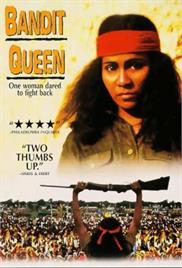Be Careful of Fake Websites. Always use HindiMovies.to domain & Join our Telegram Channel for Latest Updates.

Likes: 42
Views: 10.04K
The movie tells the story of the bandit queen Phoolan Devi who was sent to prison in 1983 and got free in 1994. During five years she was prosecuted by the Indian police and turned into a legend (like a modern Robin Hood) by the Indian press. Although the press tended to make her the optimal hero with blue eyes, dark hair, being tall and beautiful she was in reality an average Indian which makes it hard for the movie to fulfill the expectations of the audience and tell the truth at the same time. Later in her life,She entered into the politics and was assassinated in 2001.
Duration: 119 min
Released: 1995
IMDb Rating: 7.6/10 (2,874 Votes)
Genre: Biography, Drama, Hindi Movies
Stars: Nirmal Pandey, Raghuvir Yadav, Rajesh Vivek, Seema Biswas
Directors: Shekhar Kapur
Writers: Ranjit Kapoor, Mala Sen
Year: 1994
Server 1 – Estream
Server 2 – Vidto
Server 3 – Vidzi
Bandit Queen (1994): A Powerful Biographical Drama Exploring the Life of Phoolan Devi
Introduction
"Bandit Queen" is a riveting 1994 Indian biographical drama film that delves deep into the extraordinary and tumultuous life of Phoolan Devi, one of India's most infamous and enigmatic figures. Directed by Shekhar Kapur and written by Mala Sen, the film provides a searing look at the social injustices, gender violence, and caste oppression that shaped Phoolan Devi's transformation from a vulnerable young girl into a fierce bandit queen.
Plot Overview
The film traces the harrowing journey of Phoolan Devi, a young girl born into poverty in rural India, who is subjected to relentless abuse, discrimination, and exploitation. After enduring personal tragedies and violent oppression at the hands of upper-caste men, she escapes into the wilderness where she forms a band of dacoits (outlaws). As a leader, she becomes a symbol of resistance against systemic injustice and caste oppression, embodying both vengeance and empowerment.
Through a gripping and honest narrative, "Bandit Queen" does not shy away from portraying the brutality of Phoolan's experiences, including the deeply disturbing accounts of gender violence. The film ultimately presents her complex persona — a victim, a rebel, and a survivor — challenging conventional morality and societal structures.
Main Cast
In addition to Biswas and Pandey, the supporting cast brings authenticity to the film by convincingly inhabiting the various characters that interact with Phoolan throughout her life. The ensemble adds layers to the film’s exploration of social dynamics.
Director and Writer
Shekhar Kapur, an acclaimed Indian filmmaker, directed "Bandit Queen" with a focus on realism and social commentary. Known for his later works like "Elizabeth" and "Mr. India," Kapur's direction in this film was praised for its boldness and sensitivity in dealing with difficult subject matter.
The screenplay and story were adapted by Mala Sen, an activist and writer who was deeply familiar with Phoolan Devi’s life story. Sen’s contribution ensures the film remains a strong and authentic biographical account, rooted in real events with an unflinching eye on the social issues at play.
Themes and Social Context
"Bandit Queen" is more than just a biography; it is a reflection on caste discrimination, systemic patriarchy, and the violence perpetrated against women in Indian society. The film challenges viewers to confront uncomfortable truths about oppression and seeks to provide a voice to those who are often silenced.
Its unfiltered portrayal of the socio-political landscape of rural India in the 1960s and 70s is a critical backdrop that helps viewers understand the desperation and motivations behind Phoolan Devi's choices. It is a film that forces introspection and discussion about justice, revenge, and redemption.
Cinematic Style
Shot with a documentary-style realism, the cinematography captures the rugged landscapes and raw emotional intensity of the narrative. The use of non-professional actors in minor roles, along with natural locations, adds to the authenticity of the storytelling. The film’s pacing carefully balances moments of quiet suffering with explosive scenes of violence and rebellion.
Seema Biswas’ portrayal was particularly noted for its depth and courage, which earned her international acclaim and established her as one of the finest actresses in Indian cinema.
Music and Soundtrack
As a Hindi-language film deeply rooted in gritty realism and biography, "Bandit Queen" does not feature traditional Bollywood song-and-dance sequences. Instead, the soundtrack relies heavily on background score and ambient sounds to heighten the emotional gravity of the scenes. The music complements the narrative by enhancing the tension and the poignancy without disrupting the realistic tone.
Reception and Legacy
Upon its release, "Bandit Queen" was lauded by critics worldwide for its unflinching honesty and powerful performances. It won several accolades and brought international attention to Indian parallel cinema. The film sparked debates on censorship and the ethics of depicting violence and sexual assault on screen.
Phoolan Devi herself was both critical and appreciative of the movie. The film remains a landmark in Indian cinema for its brave storytelling and its role in bringing important social issues to the forefront.
Conclusion
Shekhar Kapur's "Bandit Queen" is a seminal film that transcends the boundaries of a mere biopic. With impeccable direction, compelling writing by Mala Sen, and an unforgettable performance by Seema Biswas, it paints a complex picture of resilience amidst cruelty and systemic oppression. Despite its troubling subject matter, the film ultimately tells a story of empowerment and the struggle for justice in an unjust world.
For anyone interested in Indian history, women’s rights, or social justice, "Bandit Queen" offers an unvarnished, humanized glimpse into a life that continues to inspire and provoke thought.